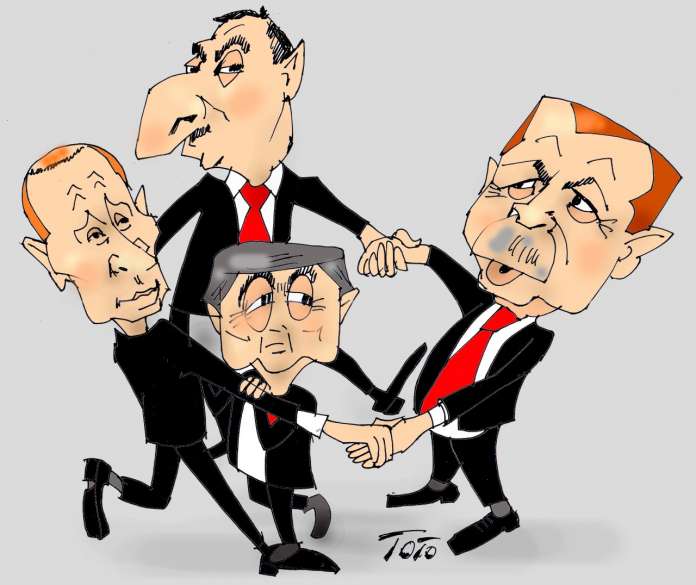Armenia is caught in the snare of an evil triangle, both politically and strategically, much like the Bermuda Triangle. The jury is out on the scientific verification of the Bermuda Triangle, but the dangers emanating from the one surrounding Armenia are very real.
There is a web of economic and strategic interests around Armenia, controlled by Russia, Turkey and Azerbaijan.
Understandably, these countries have their own national interests to which they need to attend first. In the case of Turkey and Azerbaijan, their national interests run counter to those of Armenia. Enemies can only offer hostility and threats, but the nature of our strategic ally’s interest remains in a mysterious fog.
Armenia has signed a long-term defense pact with Russia but against whom? The pact is supposed to serve Armenia’s security interests, which remain precarious, to say the least.
If Armenia will be defended against its enemies, namely Turkey and Azerbaijan, we do not see any indication of that in Russia’s behavior. Azerbaijan is armed primarily by Russia. Many officials in Armenia have been glossing over the issue, characterizing it as a business deal, but the public is not comforted by those excuses.
From the Russian side, different interpretations are being offered: that the arms deal with Azerbaijan is a simple business transaction. Or, if Russia does not supply the arms, Baku will turn elsewhere. Recently, another excuse or interpretation has emerged, that by supplying arms to both sides, Russia will maintain its leverage and preserve the balance of power.
Russian playwright Anton Chekhov stated long ago that featuring a gun in a play signifies that the gun has to fire sometime before the end of the play.
Over and above all the interpretations; actually a dangerous game of Russian roulette is at play at this time in the Caucasus.
Armenian officials thus far had been observing a silence which was supposed to be a politically correct position, but finally they have decided to break their silence.
The vice president of the ruling Republican Party, Armen Ashodyan, stated recently, “In reality, during our official and unofficial contacts, the most disturbing issue on the Russian-Armenian relations agenda is the Russian arms sales to Azerbaijan. It is not convincing no matter how they are presented; as a business deal, controlling military-political balance or anything else. In our closed sessions, we have found out that our concerns are shared also by our Russian counterparts.”
Well, if they share the concerns of the Armenian side, they have to do something about it. In fact, Azerbaijan can — and has been — purchasing arms from Israel, Pakistan and very recently, even from Canada.
In fact, Baku’s potential to use its petro-dollars from any arms market renders hollow all the above excuses and interpretations.
Adding insult to injury, Turkey also has jumped into the Russian arms market. Recent discussions between Ankara and Moscow about sophisticated arms purchases from Russia have raised some eyebrows at NATO headquarters, because in the first place, Russian armaments are incompatible with the NATO ones. But Ankara is more interested in sending a message to the West than actually depending on Russian arms for its defense. In fact, President Recep Tayyip Erdogan’s government has been alienating itself from the West through intensifying rows with Germany and siding with Qatar in the standoff in the Gulf, where the Trump administration has been pursuing a different agenda. Additionally, Washington’s support for the Kurds in Syria is also one remaining sore point in Turkish-American relations.
Returning to the Caucasus triangle, energy remains one of the most potent political weapons in determining policy.
The West has been trying to bypass Russia in meeting Europe’s energy needs. Turkey has the ideal geostrategic position in contributing to that policy. But recently, Ankara revived talks on the TurkStream pipeline, which when finished, can supply Russian gas to the Balkans. The US eventually will overcome Turkey’s tactics by selling its own gas reserves to Europe, after attaining energy self-sufficiency.
After successfully implementing fracking technology, the US has become a net exporter of energy and the drop in oil prices has a political component to it.
The Russian economy and consequently its political and military clout had been buoyed by rising oil prices. Now, with the lower oil prices, the Russian economy and political power have been dented.
Although oil prices have also dampened ambitions, they have not affected its belligerence. Recently visiting Azeri troops on the contact line, Azerbaijan’s Defense Minister Zakir Hasanov has boasted that his army had overrun Armenian defenses but was stopped by Russia.
“They know that if no one intervenes in the situation, they wouldn’t last three days. That is what happened in April 2016. If they had not stopped us, the resistance would have been broken. In 40 minutes, we ran over the lines of defense that the enemy had been building for many years.”
The statement may well serve to boost the army morale, but there may also be some truth in Russian intervention, reportedly by Defense Minister Sergey Shoigu, who ordered Hasanov to “stop this business.” But the Russian role is not new. In 1994, Armenian forces were advancing well into the Azerbaijani territory when Baku begged Moscow to intervene and that is how the ceasefire regime was established.
Azerbaijan may not resort to an all-out war because the risks are too high while Russian intervention remains a real deterrent, but it is convenient for Baku to continue a war of attrition that Armenia can ill afford.
Armenia’s sagging economy and continuing depopulation will lead Baku into a waiting game.
There is another upcoming meeting between the two presidents, initiated by Moscow. President Serzh Sargsyan does not pin much hope on that meeting, but he has decided to attend.
But will that meeting bring Armenia out of that evil triangle? That remains to be
















